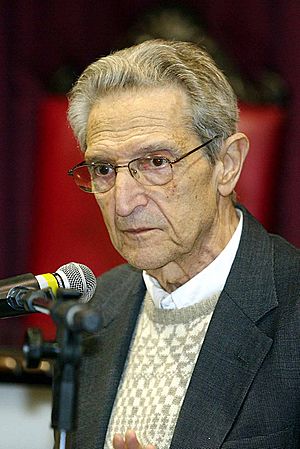Plínio de Arruda Sampaio facts for kids
Quick facts for kids
Plínio de Arruda Sampaio
|
|
|---|---|
 |
|
| Political offices | |
| 1987–1991 | Federal Deputy for São Paulo |
| 1985–1986 | Federal Deputy for São Paulo |
| 1963–1964 | Federal Deputy for São Paulo |
| 1961–1961 | Secretary of Interior and Justice Affairs of the Municipality of São Paulo |
| 1959–1961 | Deputy Chief of Staff of the State of São Paulo |
| Personal details | |
| Born |
Plínio Soares de Arruda Sampaio
26 July 1930 São Paulo, São Paulo, Brazil |
| Died | 8 December 2022 (aged 92) São Paulo, São Paulo, Brazil |
| Cause of death | Bone cancer |
| Resting place | Araçá Cemitery, São Paulo, São Paulo, Brazil 23°33′12″S 46°40′06″W / 23.5534291°S 46.6682753°W |
| Political party | PSOL (2005–2014) PT (1980–2005) MDB (1976–1980) PDC (1950–1965) |
| Spouse |
Marietta Ribeiro de Azevedo
(m. 1955) |
| Children | 6 |
| Parents |
|
| Occupation | Public prosecutor, teacher |
Plínio Soares de Arruda Sampaio (born July 26, 1930 – died December 8, 2022) was an important Brazilian thinker and activist. He was part of the Socialism and Freedom Party (PSOL). In 2010, he even ran to become the president of Brazil.
Plínio studied law at the University of São Paulo. He was the president of the Catholic University Youth group. He also worked as a prosecutor and a deputy in the Brazilian government.
He led the Brazilian Association for Land Reform (ABRA). This group worked to change how land was owned and used in Brazil. He also directed a weekly newspaper called Correio da Cidadania.
Contents
Starting a Public Life in Brazil
Plínio Arruda Sampaio was born in São Paulo, Brazil. He began working in public service in 1959. At that time, Carvalho Pinto was the governor of São Paulo state. Plínio became a vice director and later helped coordinate the government's plans.
He also served as the secretary of legal affairs for São Paulo city. From 1961 to 1962, he was the secretary of interior and justice affairs. In 1962, he was elected as a congressman for the Christian Democratic Party.
As a congressman, he worked on committees for economics, agriculture, and law enforcement. He also joined the committee on social legislation. He created a special committee to discuss land reform. His ideas for land reform made some powerful landowners very upset.
After a big change in government in 1964, he was one of the first 100 Brazilians to lose his political rights. This happened under the new military government. He was not allowed to take part in politics for ten years.
Living in Exile and Returning Home
After losing his political rights, Plínio Arruda Sampaio had to leave Brazil. He lived in Chile for six years. There, he worked for the FAO, which helps with food and farming around the world.
In 1970, he moved to the United States. He continued working for the FAO and also for the IDB in Washington. He then studied agricultural economics at Cornell University.
He returned to Brazil in 1976. He started teaching at the Getulio Vargas Foundation. He also helped create a center for cultural studies there. He joined the movement to end the military government. He also fought for amnesty, which meant allowing politicians who had been removed from public life to return.
At this time, he joined the Brazilian Democratic Movement (MDB). This was one of the few political parties allowed by the military government. He worked with other important leaders to strengthen the party.
Joining the Workers' Party (1980–2005)
In 1980, Plínio Arruda Sampaio helped create the Workers' Party (PT). He was disappointed with some political decisions by other leaders. He helped write the rules for the new party.
In 1982, he ran for congress in São Paulo and won a seat later. In 1986, he was elected as a deputy for the 1988 Constituent Assembly. This assembly was formed to write a new constitution for Brazil. He was a very popular deputy in the PT.
As part of the assembly, he became well-known for suggesting a new model for land reform. He was the only PT deputy to lead a working committee. He also served on several other important committees.
He was a deputy leader for the PT in 1987 and took over the party leadership in 1988. In 1990, he ran for governor of São Paulo but did not win.
Joining PSOL and Running for President
Plínio Arruda Sampaio left the Workers' Party in 2005. He was one of its founding members and a historic leader. However, he disagreed with the party's direction at that time. He then joined the PSOL.
In 2006, he ran for governor of São Paulo as a PSOL candidate. He believed in fighting for socialism. His ideas were different from the main views of the PSOL at the time.
Later, at a PSOL meeting, he was suggested as a candidate for president. His goal was to create a plan to help workers during economic problems. He also wanted to unite different socialist groups.
His Passing
Plínio Arruda Sampaio passed away on July 8, 2014. He was at the Hospital Sírio-Libanês in São Paulo. He had been fighting bone cancer for over a month. He was survived by his six children, including Plínio de Arruda Sampaio Jr..

